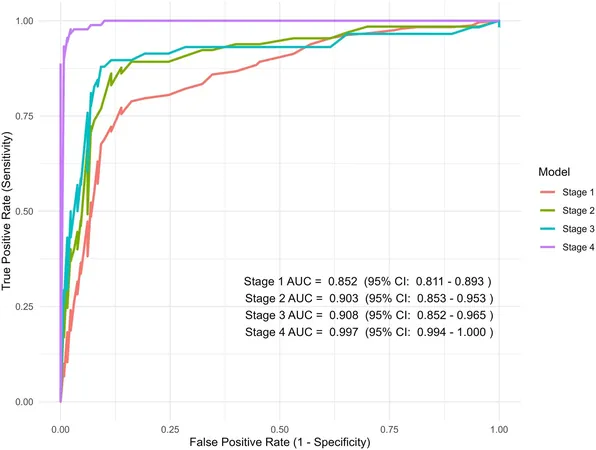
Revolutionary Blood Test Set to Transform Early Detection of Endometriosis!
2025-01-02
Author: Wei Ling
Introduction
A groundbreaking discovery is set to change the lives of millions of women and girls affected by endometriosis -- a debilitating condition that impacts around 190 million individuals worldwide! Characterized by severe pelvic pain, painful menstrual periods, and infertility, endometriosis occurs when tissue resembling the uterine lining grows outside the uterus, causing a cascade of health issues.
Breakthrough in Diagnosis
Researchers from Australia have developed an innovative, non-invasive blood test aimed at diagnosing this challenging condition, which afflicts 1 in 9 Australian women and girls. This milestone breakthrough, detailed in the esteemed journal *Human Reproduction*, marks a significant step towards providing accurate early-stage detection of the disease.
Expert Insights
According to Professor Peter Rogers, Research Director at the Royal Women's Hospital and Professor of Women's Health Research at the University of Melbourne, “This breakthrough is an exciting advance in the diagnosis of this debilitating disease.” Currently, women may wait an excruciating average of seven years before receiving a diagnosis, during which they endure debilitating symptoms that hinder their quality of life and can diminish their fertility.
Development of the Test
The innovative test, developed by the Perth-based medical technology firm Proteomics International in collaboration with prominent institutions including the Royal Women’s Hospital and the University of Melbourne, analyzed plasma samples from 805 participants across two independent clinical trials. The managing director of Proteomics International, Dr. Richard Lipscombe, explained that researchers identified 10 unique protein biomarkers in the blood, referred to as "fingerprints," which are indicative of endometriosis presence.
Benefits and Economic Impact
This new blood test, aptly named PromarkerEndo, has the potential to drastically reduce the time and financial burdens associated with traditional diagnostic methods, which often include costly ultrasounds, invasive laparoscopies, and MRIs. The ease of a blood test may provide a more cost-effective solution for patients and the healthcare system, ensuring that women receive prompt, targeted care.
Conclusion
In Australia alone, endometriosis carries an estimated annual economic burden of $9.7 billion. Fortunately, the PromarkerEndo test has shown excellent efficacy in differentiating between healthy individuals and those exhibiting symptoms of the disease, as well as accurately identifying those in the early stages of endometriosis.
Future Directions
While there remains no definitive cure for endometriosis, effective management typically focuses on controlling symptoms. Professor Rogers emphasizes the necessity of early diagnosis and intervention, noting that “Detecting endometriosis at an early stage increases treatment options and may enhance a patient’s response to treatments like laser ablation or existing medical therapies.” Alarmingly, healthy women undergoing fertility treatments show a three-fold increased incidence of endometriosis, showcasing the urgency for better diagnostic tools.
Final Thoughts
As research continues to validate and refine this promising blood test for clinical use, it is hoped that millions of women worldwide will benefit from quicker diagnosis and improved treatment strategies, potentially transforming the landscape of endometriosis care. Stay tuned as this riveting story develops!


 Brasil (PT)
Brasil (PT)
 Canada (EN)
Canada (EN)
 Chile (ES)
Chile (ES)
 Česko (CS)
Česko (CS)
 대한민국 (KO)
대한민국 (KO)
 España (ES)
España (ES)
 France (FR)
France (FR)
 Hong Kong (EN)
Hong Kong (EN)
 Italia (IT)
Italia (IT)
 日本 (JA)
日本 (JA)
 Magyarország (HU)
Magyarország (HU)
 Norge (NO)
Norge (NO)
 Polska (PL)
Polska (PL)
 Schweiz (DE)
Schweiz (DE)
 Singapore (EN)
Singapore (EN)
 Sverige (SV)
Sverige (SV)
 Suomi (FI)
Suomi (FI)
 Türkiye (TR)
Türkiye (TR)
 الإمارات العربية المتحدة (AR)
الإمارات العربية المتحدة (AR)